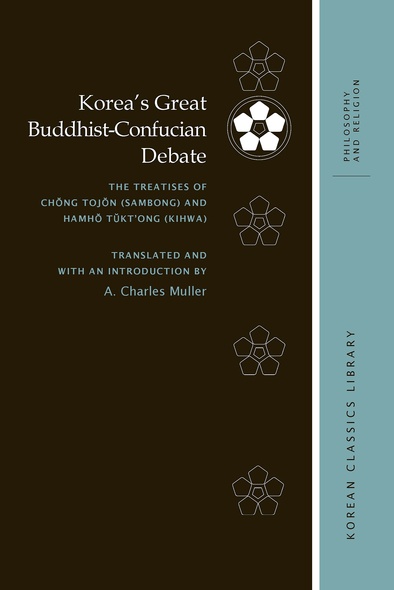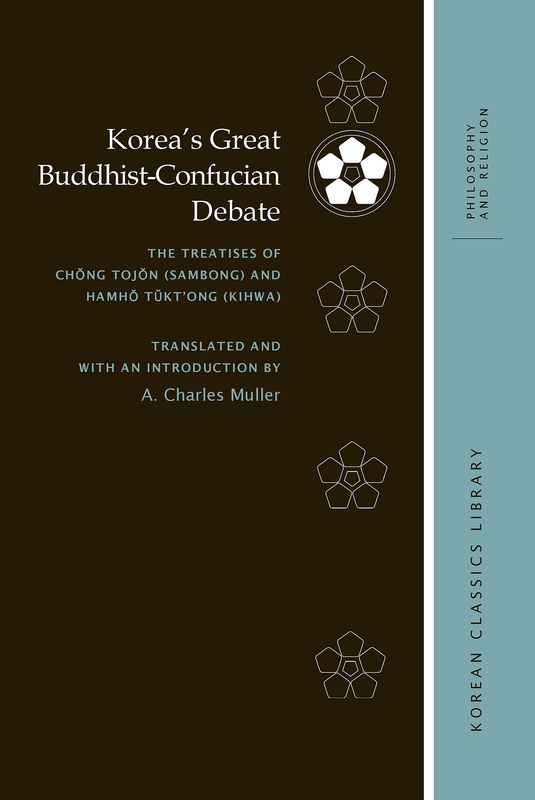
Korea’s Great Buddhist-Confucian Debate
The Treatises of Chŏng Tojŏn (Sambong) and Hamhŏ Tŭkt’ong (Kihwa)
This volume makes available in English the seminal treatises in Korea’s greatest interreligious debate of the fourteenth and fifteenth centuries. On Mind, Material Force, and Principle and An Array of Critiques of Buddhism by Confucian statesman Chŏng Tojŏn (1342–1398) and Exposition of Orthodoxy by Sŏn monk Kihwa (1376–1433) are presented here with extensive annotation. A substantial introduction provides a summary and analysis of the philosophical positions of both Neo-Confucianism and Buddhism as well as a germane history of the interactions between these two traditions in East Asia, offering insight into religious tensions that persist to this day.
Translator A. Charles Muller shows how, from the time Confucianism and Buddhism met in China, these thought systems existed, along with Daoism, in a competing relationship that featured significant mutual influence. A confrontative situation eventually developed in China, wherein Confucian leaders began to criticize Buddhism. During the late-Koryŏ and early-Chosŏn periods in Korea, the Neo-Confucian polemic became the driving force in the movement to oust Buddhism from its position as Korea’s state religion. In his essays, Chŏng drew together the gamut of arguments that had been made against Buddhism throughout its long history in Korea. Kihwa’s essay met Neo-Confucian contentions with an articulate Buddhist response. Thus, in a rare moment in the history of religions, a true philosophical debate ensued.
This debate was made possible based upon the two religions’ shared philosophical paradigm: essence-function (ch’e-yong). This traditional East Asian way of interpreting society, events, phenomena, human beings, and the world understands all things to have both essence and function, two contrasting yet wholly contiguous and mutually containing components. All three East Asian traditions took this as their underlying philosophical paradigm, and it is through this paradigm that they evaluated and criticized each other’s doctrines and practices.
Specialists in philosophy, religion, and Korean studies will appreciate Muller’s exploration of this pivotal moment in Korean intellectual history. Because it includes a broad overview of the interactive history of East Asian religions, this book can also serve as a general introduction to East Asian philosophical thought.
This edition is an excellent translation of three pivotal primary sources that will allow them to receive the greater attention they deserve in English-language discussions of Korean, East Asian, and comparative philosophy. These texts clearly illustrate how concepts with universal import can be found in East Asian texts if we read them as we read Western texts and not as merely limited to particular local contexts.
Korea’s Great Buddhist–Confucian Debate is an outstanding translation of three seminal essays and contains much fruitful material when approached from the pedagogical standpoint of an instructor seeking thought-provoking materials on East Asian thought and culture that can be used in the development of critical thinking skills.
On the whole, Muller’s book is an important new resource that can serve as a great introduction to the historical developments and meanings of the Buddhist-Confucian discourses in premodern East Asia. With his masterful translation of the polemical essays of a Buddhist monk and a Confucian scholar-official, the book can be recommended for undergraduate or graduate students and scholars in East Asian studies and religious studies who are interested in interreligious relations.
Korea’s Great Buddhist Confucian Debate: The Treatises of Chŏng Tojŏn (Sambong) and Hamhŏ Tŭkt’ong (Kihwa) is a superlative book put together by Korean Studies scholar and translator A. Charles Muller.




